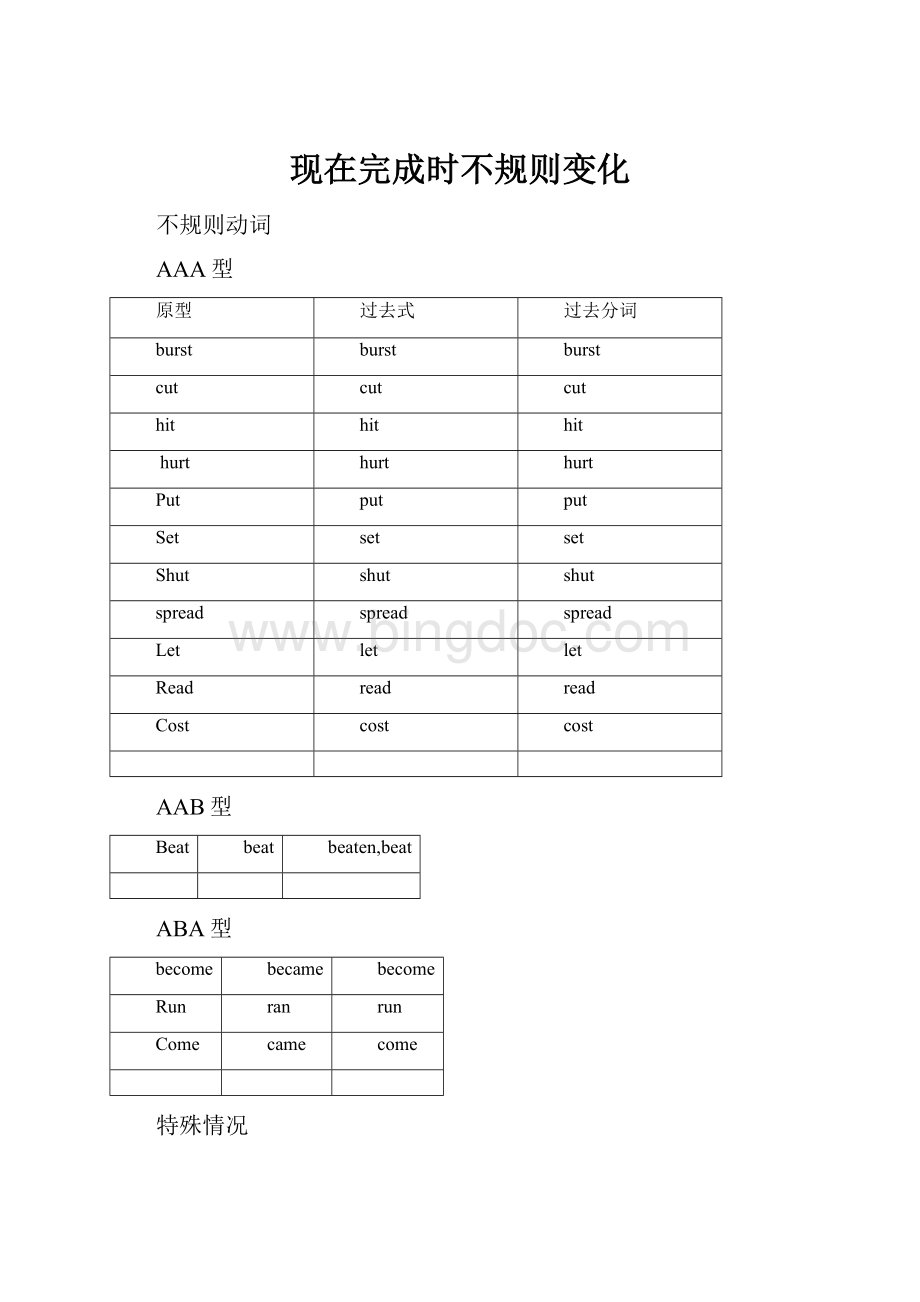现在完成时不规则变化.docx
《现在完成时不规则变化.docx》由会员分享,可在线阅读,更多相关《现在完成时不规则变化.docx(16页珍藏版)》请在冰点文库上搜索。

现在完成时不规则变化
不规则动词
AAA型
原型
过去式
过去分词
burst
burst
burst
cut
cut
cut
hit
hit
hit
hurt
hurt
hurt
Put
put
put
Set
set
set
Shut
shut
shut
spread
spread
spread
Let
let
let
Read
read
read
Cost
cost
cost
AAB型
Beat
beat
beaten,beat
ABA型
become
became
become
Run
ran
run
Come
came
come
特殊情况
Read
read
read
(read原形发音为/ri:
d/,过去式和过去分词发音为/red/)
ABB型
bring
brought
brought
Buy
bought
bought
build
built
built
Burn
burnt
burnt
catch
caught
caught
Dig(挖)
dug
dug
Feel
felt
felt
fight
fought
fought
Find
found
found
Feed
fed
fed
get
got
got
Hang
hung,hanged
hung,
hanged
Hear
heard
heard
Hold
held
held
Keep
kept
kept
lay
laid
laid
Lead
led
led
Lose
lost
lost
leave
left
left
Lend
lent
lent
Make
made
made
Mean
meant
meant
Meet
met
met
Pay
paid
paid
sell
sold
sold
shoot
shot
shot
say
said
said
sit
sat
sat
stand
stood
stood
shine
shone
shone
sweep
swept
swept
sleep
slept
slept
teach
taught
taught
tell
told
told
think
thought
thought
win
won
won
wind
wound
wound
ABC型
begin
began
begun
bear
bore
born,borne
blow
blew
blown
break
broke
broken
choose
chose
chosen
draw
drew
drawn
drive
drove
driven
do/does
did
done
fly
flew
flown
forgive
forgave
forgiven
forget
forgot
forgotten,forgot
freeze
froze
frozen
drink
drank
drunk
give
gave
given
go
went
gone
know
knew
known
grow
grew
grown
lie
lay
lain
ride
rode
ridden
rise
rose
risen
ring
rang
rung
shake
shook
shaken
sing
sang
sung
sink
sank
sunk
swim
swam
swum
throw
threw
thrown
write
wrote
written
take
took
taken
wear
wore
worn
see
saw
seen
be
was/were
been
AB型
can
could
may
might
shall
should
will
would
be
was/were
(1)现在完成时用来表示现在之前已发生过或完成的动作或状态,但其结果却和现在有联系,也就是说,动作或状态发生在过去但它的影响现在还存在,也就是说,动作发生在过去,而对现在造成的影响和结果.
Ihavespentallofmymoney.(现在我没有钱花了.)
Janehaslaidthetable.(简已经摆好了桌子)
Michaelhasbeenill.(迈克尔现在仍然很虚弱)
Hehasreturnedfromabroad.(他现在已从国外回到此地)
(2)现在完成时可以用来表示发生在过去某一时刻的,持续到现在的动作(用行为动词表示)或状态(be动词表示)常与for(+时间段),since(+时间点或过去时的句子)连用.
①for+时段为…时间
②since+过去一个时间点(译为:
自从……以来)
③since+时段+ago
④since+从句(过去时)
⑤Itis+时段+since+从句(过去时)
Maryhasbeenillforthreedays.
Ihavelivedheresince1998.
注:
瞬间动词(buy,die,join,lose……)不能直接与forsince连用。
要改变动词
come/arrive/reach/getto-----bein
goout----beout
finish----beover
open----beopen
die----bedead
Buy---have
Fallill---beill
Comeback---beback
Puton---beon/wear
Worry---beworried
Catchacold---haveacold
⑥介词by在完成时态中用于表示截止日期
………………
★1.have代替buy
Mybrotherhashad(不能用hasbought)thisbikeforalmostfouryears.
★2、用keep或have代替borrow
Ihavekept(不能用haveborrowed)thebookforquiteafewdays.
★3、用be替代become
Howlonghasyoursisterbeenateacher?
★4、用haveacold代替catchacold
Tomhashadacoldsincethedaybeforeyesterday.
★5、用wear代替puton
b)用“be+形容词”代终止性动词
1、be+married代marry2、be+ill代fall(get)ill
3、be+dead代die4、be+asleep代fall(get)asleep
5、be+awake代wake/wakeup6、be+gone代lose,die,sell,leave
7、be+open代open8、beclosed代close/shut
9、be+missing(gone,lost)代lose
c)用“be+副词”代终止性动词
1“be+on”代start,begin
2“be+up”代getup
3“be+back(to)”代returnto,comebackto,gobackto
4“behere(there)”代come(arrive,reach,get)here或go(arrive,reach,get)there等等
d)用“be+介词短语”代终止性动词
1.“bein/at+地点”代替goto/cometo
2.用beinthearmy代替jointhearmy
3.“bein/at+地点”代替moveto
常用瞬间动词变延续性动词表
常用短暂性动词变延续性动词表+相应的介词:
1.havearrivedat/insw.gotto/reachedsw.come/gone/movedtosw.——havebeeninsw./at…
2.havecome/goneback/returned——havebeenback
3.havecome/goneout——havebeenout
4.havebecome——havebeen
5.haveclosed/opened——havebeenclosed/opened
6.havegotup——havebeenup;
7.havedied——havebeendead;
8.haveleftsw.——havebeenawayfromsw.
9.havefallenasleep/gottosleep——havebeenasleep;
10.havefinished/ended/completed——havebeenover;
11.havemarried——havebeenmarried;
12.havestarted/beguntodosth.——havedonesth.;
13.havebegun——havebeenon
14.haveborrowed/bought——havekept/had
15.havelost——haven’thad
16.haveputon——haveworn
17.havecaught/getacold——havehadacold;
18.havegottoknow——haveknown
19.have/hasgoneto——havebeenin
eto——bein
21.havejoined/havetakenpartintheleague/theParty/thearmy——havebeenamemberof/havebeenin/havebeentheParty’smember/theleaguemember/thesoldier…
Ⅰ.强调过去的行为对现在的影响。
eg.Theyoungmanhasjoinedthearmy.那位年轻人参军了。
用法注意
1.现在完成时不能单独与准确时间连用,(如表示过去的时间状语)
如yesterday(morning、afternoon),last(morning、afternoon)等,除非与for,since连用.
2.现在完成时往往同表示不确定的过去时间状语连用
如already(肯定),yet(否定,疑问),just,before,recently,still,lately,never等:
Hehasalreadyobtainedascholarship.
Ihaven'tseenmuchofhimrecently(lately).
Wehaveseenthatfilmbefore.
Havetheyfoundthemissingchildyet
3.现在完成时常常与表示频度的时间状语连用,
如often,sometimes,ever,never,twice,onseveraloccasion等:
HaveyoueverbeentoBeijing
IhaveneverheardBunnysayanythingagainsther.
Ihaveusedthispenonlythreetimes.Itisstillgood.
Georgehasmetthatgentlemanonseveraloccasions.
4.现在完成时还往往可以同包括现在时间在内的时间状语连用,
如now,uptothesefewdays/weeks/months/years,thismorning/week/month/year,just,today,uptopresent,sofar等:
Peterhaswrittensixpaperssofar.
Manhasnowlearnedtoreleaseenergyfromthenucleusoftheatom.
TherehasbeentoomuchraininSanFranciscothisyear.
Thefriendlyrelationsandcooperationbetweenourtwocountrieshavebeenenhancedinthepastfewyears.
Uptothepresenteverythinghasbeensuccessful.
5.现在完成时还可以用来表示过去的一个时间到现在这段时间内重复发生的动作. Wehavehadfourtextsthissemester.
6.现在完成时的"完成用法"
现在完成时的"完成用法"指的是动作发生在过去某一时刻并已结束,但该动作对现在产生了影响,与现在情况具有因果关系。
例如:
Hehasturnedoffthelight.他已把灯关了。
(动作结束于过去,但说明的是现在的情况--灯现在不亮了。
)
现在完成时"完成用法"的特点是动作不延续,因此,该时态只能与表示不定的过去时间状语(如:
already,yet,before,recently等)、频度时间状语(如:
never,ever,once等)、包括现在时刻在内的时间状语(如:
thismorning/month/year...,today等)连用。
例如:
Haveyoufoundyourpenyet?
你已找到你的钢笔了吗?
7.现在完成时的"未完成用法"
现在完成时的"未完成用法"指的是动作开始于过去某一时刻,一直延续到现在,或可能还要继续下去。
例如:
Hehaslivedheresince1978.自从1978年以来,他一直住在这儿。
(动作起始于1978年,一直住到现在,可能还要继续住下去。
)
Ihavebeeninthearmyformorethan5years.我在部队已经呆了五年多了。
(动作开始于5年前,一直延续至今,有可能还要继续下去。
)
此种用法的句中常需一个表示一段时间的状语(由since或for引导),或表示与现在时刻相连的时间状语(如:
uptonow,sofar)等。
例如:
Ihaveheardnothingfromhimuptonow.到目前为止我没有他的任何消息。
注意:
(1)现在完成时的未完成用法只适用于延续性动词,不可用于终止性动词,即瞬间完成或延续时间很短的动词。
如:
come,go,arrive,leave,join,become,die等。
8.一段时间+haspassed+since从句
9.现在完成时常和短语"uptonow/tillnow","sofar"(意思是从过去某一确定的时间一直延续到现在)连用。
Upto/tillnowhe'sreadmanystorybooks.至今他已读过好多故事书。
I'vebeentoNewYorkthreetimessofar.至今我已到纽约去过三次。
10hasgone(to),hasbeen(to),hasbeen(in)的区别
gone:
去了没回
beento:
去过
beenin:
呆了很久
10.不能与when连用
11.不可以与一般过去时的定义混淆
一般过去时和现在完成时
(1)、一般过去时的谓语动词用过去式,而现在完成时的谓语基本构成是“主语+have/has+动词(V.)的过去分词”。
过去时表示过去某时发生的动作或单纯叙述过去的事情,强调动作;现在完成时为过去发生的,强调过去的事情对现在的影响,强调的是影响。
(2)、一般过去时通常与表示过去的时间状语连用。
如:
yesterday,lastweek,twoyearsago,justnow,in2002等;而现在完成时则常与just,already,ever,never等副词和thesedays,thisweek,since......,for......等表示一段时间的状语连用。
试比较以下几组句子,有什么区别:
①A:
Haveyouseenthefilm
B:
Didyouseethefilm
分析:
你看过这部电影吗?
(A)句强调的是被问者对剧情是否了解;(B)句强调的是看这部电影的动作是否发生过,并不强调是否知道其内容。
②A:
Howhashedoneit
B:
Howdidhedoit
分析:
他是怎么做的这件事?
(A)句强调的是他做这件事的方式对现在产生了某种影响;(B)句单纯的询问做这件事的方式。
③A:
HehaslivedinBeijingfor8years.
B:
HelivedinBeijingfor8years.
分析:
他在北京住了8年。
(A)句讲的是到目前为止他在北京住了8年,可能还会继续在北京住下去。
(B)句讲的是他在北京住过8年,现在已经不在北京了。
(3)现在完成时强调过去发生的动作对现在的影响和结果,而一般过去时与现在没有联系,只是说明某个动作发生的时间是在过去。
比:
Ihavewashedthecar.我洗过了车。
(看上去很漂亮)
Iwashedthecaramomentago. 我刚才洗过车了。
Shehaswateredtheflowers. 她已经浇了花。
(不需要再浇了)
Shewateredtheflowersyesterday. 她昨天浇的花。
IhavewrittentheletterbutIhaven'tpostedityet.信我已经写好了,但还没有寄出。
IwrotetheletterlastweekandIposteditthreedaysago. 我上周写的那封信,3天前寄出的。
(4)现在完成时表示的动作或状态延续到现在并可能延续下去,而一般过去时则单纯表示过去某段时间内的经历。
比:
Ithasrainedforfivehours.雨已经下了5个小时了。
Itrainedforfivehoursyesterday. 昨天下了5个小时的雨。
Hehaswaitedforherfortwohours.他等她已经两个小时了。
Hewaitedforhertwohoursandthenwenthome. 他等她等了两个小时,然后就回家了。
Ihavereviewedtwolessonsthismorning. 今天上午我已经复习了两课。
(说话时还在上午)
Ireviewedtwolessonsthismorning. 今天上午我复习了两课。
(说话时已是下午或晚上)
现在完成时与现在完成进行时相同点
1.在和一段时间状语连用时,现在完成时和现在完成进行时都可以表示从过去某一时刻开始一直延续到现在的动作.如:
Ihaveworkedinthisschoolsince2001.
Ihavebeenworkingheresince2001.
2.现在完成时和现在完成进行时都可以表示一段时间内进行的动作.例如:
Mr.SmithhastaughtEnglishfor20years.
Mr.SmithhasbeenteachingEnglishfor20years.
以上句子用现在完成时与现在完成进行时,含义上没有什么差别,两种时态可以互相换.但两种时态也存在有意义上和用法上的差别.
现在完成时与现在完成进行时不同点
1.从定义上来看,现在完成时表示的是已经完成的动作或者状态,常常与already"已经"或ever"曾经"连用,如:
WehavealreadylearntModule3.我们已经学习了第三模块.
SheisthemostbeautifulgirlIhaveeverseen.她是我见过的最漂亮的女孩.
而现在完成进行时则表示的是从过去某一时刻开始一直延续到现在,有可能还要进行下去的动作,一般不与already或ever等连用,如:
WehavebeenlearningModule4.我们一直在学习第四模块.(不一定学完)
注意下面这组句子含义上的区别:
Ihavereadthenovel.我看过那本书了.(已看完)
Ihavebeenreadingthenovel.(一直在看,不一定看完)
2.相对于现在完成时表示一次性,现在完成进行时可以表示动作的重复.如:
Ihavemethimatthelibrary.(我在图书馆见过他.)
Ihavebeen